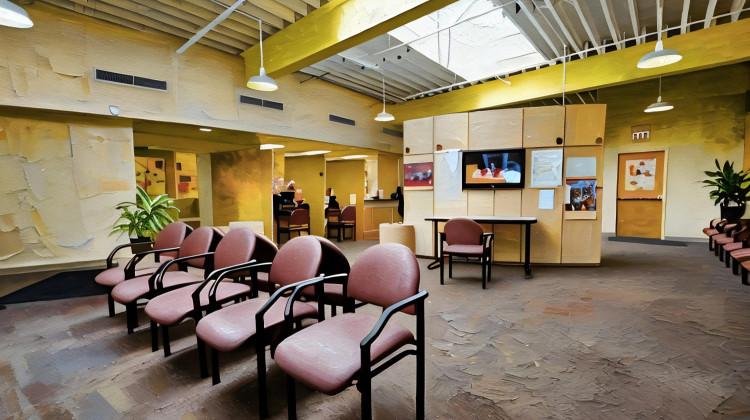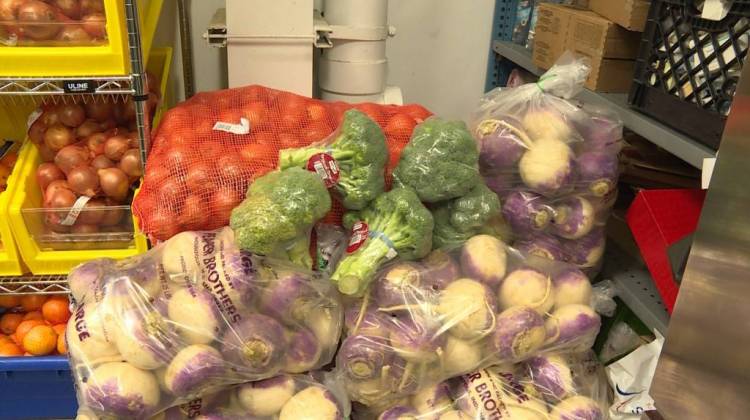
Fear of deportation is keeping people away from their doctors. It could have consequences.
Credit: Photo courtesy of CommunityHealth, image modified by Kathryn DugalEarly this year, President Trump rolled back a policy that kept federal immigration agents from “sensitive” areas like schools and medical facilities.
According to a report from Axios, there has been a 127% increase in ICE arrests in Indiana from January to June of this year. Doctors, and others, worry that this will have negative health impacts on some of the 11 million immigrants here without legal status.
Lizzy McGrevy sat down with Ryan Levi, a reporter with Tradeoffs, to talk about how fear is keeping people away from the doctor’s office.
This transcript has been edited for style and clarity.
Lizzy McGrevy: All right, Ryan, can you just start by telling us about the impact of this constant fear of deportation on immigrants in America?
Ryan Levi: Yeah, absolutely. So research shows that this constant fear of deportation can harm people's physical and mental health, and this is especially true in kids.
This kind of constant, low-lying fear is often referred to as toxic stress, and studies have shown that it can lead to anxiety, depression, and PTSD, as well as increased risk of infection, diabetes, heart disease, asthma and cancer.
Lizzy: So as a result of this fear, some immigrants are not attending in-person health appointments, right? So what are experts saying about how this impacts health?
Ryan: Yeah, so I talked with more than a dozen people who provide care to or study the health of this population. One clinic in Chicago told me that they've seen a noticeable jump in the number of people canceling or not showing up for appointments, as well as a big spike in people not picking up their prescriptions, especially at times when immigration enforcement is in the headlines.
And these experts told me that they're really worried that people who stay away could see their chronic diseases like diabetes and hypertension get worse, and that folks could miss critical preventive care like immunizations and cancer screenings.
Cancer Screenings was something that we saw being issued during the pandemic, during the covid pandemic, which was another time when we saw a lot of people avoiding care.
Lizzy: So it's been difficult and expensive for members of this community to attend routine appointments, generally. So Ryan, what can you tell us about how this moment is different from how people without legal status are accessing or weren't accessing care before?
Ryan: Absolutely, folks without legal status are generally unable to access health insurance, and they've always had to be worried about law enforcement. But several providers told me that this moment feels different, even different from Trump's first administration, really just because of the scale and scope of immigration enforcement that we're seeing right now.
They said it felt more like COVID when they had to rethink everything they were used to doing in order to care for their patients.
Lizzy: Ryan, you mentioned COVID, so naturally, I had flashbacks to all of the times I was sitting in my home office. You know, having virtual appointments with my therapist, with specialists. Is this something that can still be extended to immigrant patients? And what are some of the other tools hospitals and providers are using to help people who are too afraid to attend in person?
Ryan: Absolutely, Steph Wilding, who runs that clinic in Chicago I mentioned earlier, which is called Community Health, she told me that they've been doing a lot more telehealth and also reminding folks that other people can pick up their prescriptions. Just generally trying to find ways to put folks at ease. We're also seeing a lot of places train their staff on what to do if ICE shows up, and they're rearranging their waiting areas to be less public.
And the biggest thing that I heard, kind of over and over again, was providers are trying to communicate to their patients that it is safe for them to come in and it's important for them to come in, though, Steph and everyone I talked to also acknowledge that there's a limit to the safety that they can promise their patients right now.
Lizzy: Ryan, thank you for this information. You can find the full story on tradeoffs.org and until next time, stay safe.
 DONATE
DONATE






 Support WFYI. We can't do it without you.
Support WFYI. We can't do it without you.